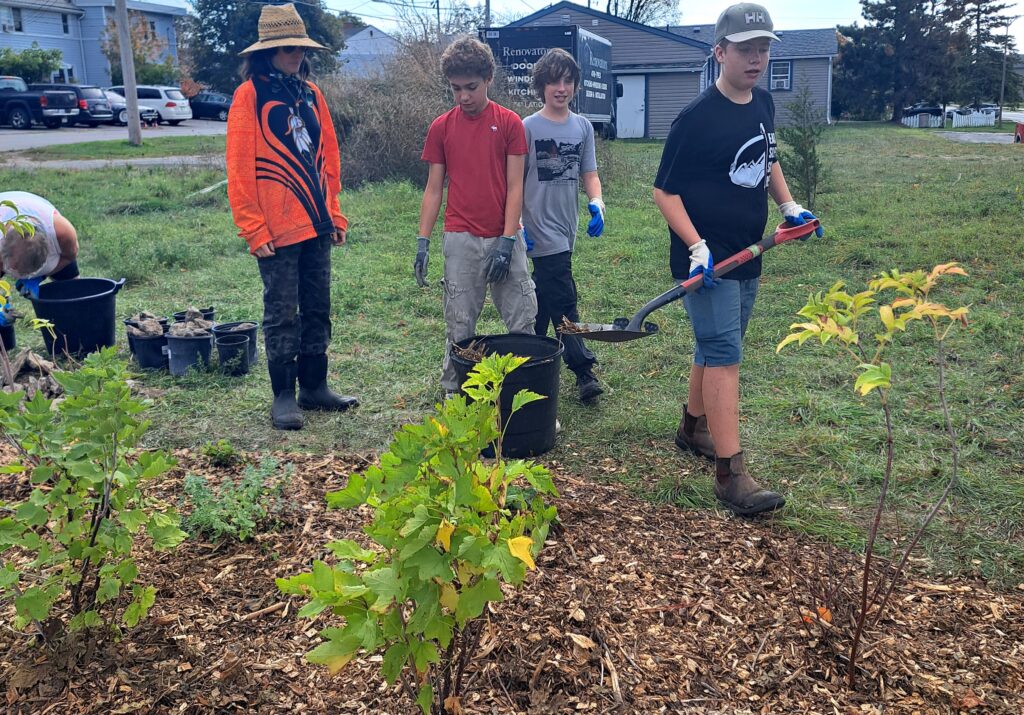 Picton Food Bank’s Mark Houghton was part of an eager crew at a Food Forest planting at Macaulay Village Park October 4. (Supplied Photo)
Picton Food Bank’s Mark Houghton was part of an eager crew at a Food Forest planting at Macaulay Village Park October 4. (Supplied Photo)
The Macaulay Village Neighbourhood Group, in partnership with the Prince Edward Learning Centre, Victoria Taylor Landscape Architect and with the support of TD Bank’s Friends of the Environment, has planted a community food forest in Macaulay Village.
By next summer, it will offer a variety of berries, perennial herbs, and rhubarb—creating “public food in public places” that residents can enjoy for years to come.
“This project is about growing more than food—it’s about growing community,” said Jennifer Hunter, Program Coordinator at PELC and member of the Macaulay Village Neighbourhood Group. “By planting together, eating together, and supporting each other, we’re building a stronger, more food-secure Prince Edward County.”
The food forest is part of a multi-prong answer to food insecurity. It’s also just a small part of a bigger plan.
Macaulay Village has created a Neighbourhood Plan to continue to create a vibrant and flourishing neighbourhood.
Developed through support from Thrive, PELC, The County Foundation and United Way HPE, the Plan “is to realize the Heights’ (Macaulay Village’s) vision for their community, and to support advocacy for a bright, affordable, inclusive, neighbourhood.”
Built from data and recommendations gleaned through the Heights Community Survey, the Plan reflects neighbourhood needs. Volunteers canvassed the community through social media and in-person meetings in 2023 and identified four key priorities: Affordable Housing, a Community Centre, Frequent Transportation and Community Programming.

“The Heights, or Macaulay Village, has been advocating for itself for some time,” notes PELC’s Christine Durant. “Most recently the community successfully advocated for a new park, community garden, shade structure and playground; before that, advocacy led to sidewalks and lights to walk to and from the downtown core,” said Ms. Durant.
“Now, the Neighbourhood Plan comes out of shared values for a vibrant community where everyone supports each other, where the community can flourish, and where everyone has a say.”
The Plan calls for any future developments to have an affordable housing ratio of 15 percent and/or to set aside 10 percent of units for rent geared to income. “Affordable” is defined as 80 percent of market rent.
It also calls for housing diversity, and asks that developers address community needs by funding food banks, community meals, and children’s programming.
The Plan draws on elements of the Community Benefits Framework developed by PELC and The County Foundation, which suggests that developers be lobbied to hire local people, provide skills training, meet living wage thresholds, and create spaces for social enterprises, as well as youth-focused and recreation spaces.
Ms. Durant points to development both adjacent to and within Macaulay Village. Base31 has long-term plans for 7,500 homes. Work on the design and architecture of the first of its residential neighbourhoods, Village A, off County Road 22 between the Heights and the Base’s Revitalization District, is underway. Meanwhile, FLC has plans for 432 homes within the Heights in its Vineridge development. Most Nery Circle residents have been displaced to make way for the new development, but it seems stalled within the planning process. The application has not been updated since 2022.
The cost of housing in Prince Edward County continues to rise at unaffordable rates. Macaulay Village, which has about 110 homes, is an accessible community known for affordable housing and rental accommodations.
But its corner store closed 15 years ago and a youth recreation centre was shuttered due to structural issues and never replaced. These community needs are addressed in the new Neighbourhood Plan.
“The community feels the loss of these amenities as well as rising costs and the encroachment of future developments,” said Ms. Durant.
One of the most pressing issues in Prince Edward County is food scarcity this year. The Macaulay Village Neighbourhood Group and PELC have launched a series of initiatives over and above the food forest to help neighbours support neighbours, including monthly community meals and gatherings, a free food pantry where residents can take what they need or share what they can, and the community garden.
Installed in July, the mini pantry supports many local residents. Neighbours, local businesses and the Picton Food Bank help keep it stocked.
See it in the newspaper